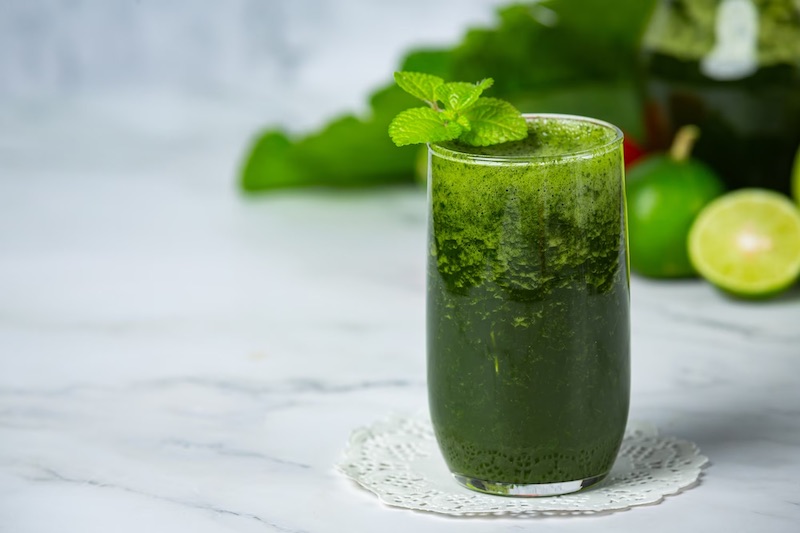Why Cold-Pressed Juice Is In High Demand

Soaring health awareness among people has raised the preference for convenient, safer, refreshing and healthy beverages that are caffeine-free, calorie-free, and free from toxins and artificial ingredients.
This soaring health conscious trend has created robust advances in mixed vegetables and fruits segment within the cold-pressed juice market. Surging demand for a variety of green beverages should favor the worldwide market as well.
Manufacturers are progressively coming up with new juice flavors, such as green juice with cucumber, leafy greens, splash pineapples and coconut water to leverage the heightened demand among health-conscious consumers.
What Is Cold-Pressed Juice, Anyway?
Cold-pressed juice is basically juice made without exposing it to heat during the juicing process. Cold-pressed juice makes use of a hydraulic press that helps in the extraction of juice from vegetables and fruits, as opposed to techniques like single or centrifugal auger.
When you cold-press your juice, it retains more of its vitamins, minerals, antioxidants, and enzymes content than regular juice. This makes it a healthier alternative to traditional juicing.
Cold-pressed juices are refrigerated for around three days when micronutrient and phytochemical degradation takes place, without high-pressure processing or pasteurization.
Some juicers utilize a technology that delays the oxidation process, allowing slightly extended storage in refrigerators. This juice type has commercial appeal worldwide and has gained traction since 2013.
Generally, cold-pressed juices are a little more expensive compared to other juice types, since these are made from 100% fruits and vegetables, without addition of any other ingredients.
Differences Between Cold Pressed Juice and Normal Juice
Normal juicing is made using a centrifugal juicer that has sharp blades. These blades spin at extremely high speeds, pulverizing the ingredients and extracting the juice. Although quicker than cold pressing, this technique generates a lot of heat. It often destroys the vibrant, fresh flavor of the fruit or vegetable ingredients, degrading the nutritional value.
A variety of normal juices contain sweeteners or added sugars, chemicals, and artificial flavors in a bid to compensate for the reduced product quality. Some normal juices are actually even more or as unhealthy as different brands of sodas.
Cold-pressed juices, however, contain considerably more minerals, vitamins, digestive enzymes, antioxidants, and various other nutrients in comparison to normal juices that are made using juicing processes that produce heat. As such, cold-pressed juices provide much more health benefits, almost the same as consuming raw vegetables and fruits.
Popular Vegetables and Fruits Used in Cold Pressed Juices

Some of the most popular fruits and vegetables used to produce cold-pressed juices include:
I. Kale
Kale is one of the most popular vegetables used in cold-pressed juices, as it contains a variety of nutrients and boasts a mild flavor that can be masked by any fruit for additional taste.
This is a highly versatile green leafy vegetable that goes along well with almost any other fruit or vegetable. It contains high levels of vitamins A, C, and K.
Raw kale in particular has a high content of antioxidants that help combat various health issues, including signs of aging.
II. Apples
Apples are some of the most popular and in-demand fruits, owing to their high availability, affordability, great taste, and nutritional value.
Apple juice has a sweet, pleasant, refreshing, and crisp taste, with anti-inflammatory and anti-allergy properties.
However, beware excessive consumption of apple juice can be harmful as it contains high levels of sugar as well as simple carbohydrates.
III. Wheatgrass
The emergence of this edible nutritious grass has made waves within the juicing space, thanks to its impressive nutrient density.
Wheatgrass provides a substantial amount of copper, magnesium, iron, and 17 amino acids. It also has chlorophyll that offers anti-cancer and anti-inflammatory properties.
Wheatgrass can be consumed in various ways, including fresh or blended with juice.
IV. Cranberries
Raw cranberries are tarty and have a lot to offer in terms of health benefits. Given the strong taste, cranberry cold-pressed juice is generally blended with other types of fruits to foster its palatability.
Cranberries have significant levels of antioxidants, which help reduce LDL cholesterol, and fight off urinary tract infections (UTIs).
V. Others
Other popular cold-press judicable fruits and vegetables are carrots, oranges, pears, blueberries, cabbage, cucumbers, kiwis, lemons, spinach, and more.
Benefits of Cold-Pressed Juices
Among the many benefits of cold-pressed juices that have made them so popular are:
1. Helps you meet your daily healthy diet intake requirements
The nature, hustle and bustle of our modern lifestyles has widened the gap between the recommended daily intake of nutrients and the actual intake of nutrients for good health.
Very few people today are able to cook healthy, balanced, and nutritious meals that comprise every food group daily. Many of us today do not even get our recommended daily intake of fruits and vegetables for good health.
That is where cold-pressed juice comes in and has made a name for itself, bridging this gap. Cold-pressed juices allow people to conveniently meet their daily recommended healthy diet consumption conveniently and affordably.
A few gulps of cold-pressed juice in-between your day-to-day activities means that you can meet and fulfill your recommended daily intake of essential nutrients satisfactorily.
2. Helps with shedding off excess weight
Weight loss is one of the biggest boons of cold-pressed juicing. This is because juice can help bring down your calorie intake without compromising on essential nutrients intake.
Anecdotal evidence shows that juice diets may lead to rapid weight loss in the short term, especially when they are very low in calories. Carrot juice which is low in calories and full of fibre, for example, is considered a superfood for weight loss due to its high fibre content.
Just one glass of cold-pressed carrot juice will keep you full until lunch and thus will stop you from bingeing and aid in calorie control. More than that, carrot juice stimulates bile secretion which helps to burn fat and thus aids in excess weight loss.
3. Helps improve mood
It goes without saying that mood and mental disorders are complex conditions that are somewhat related. Raw and cold-pressed vegetable and fruit extracts can help to moderate the signs and symptoms of mental distress as well as depression.
Healthy eating habits involve the inclusion of more organic and raw foods in the daily diet, which includes cold-pressed juices. These juices are known to safeguard against the development of circumstantial stress and depression.
4. Better cardiovascular health
Cold-pressed juices benefit the heart too. According to the Heart and Stroke Foundation of Canada, studies show that drinking no more than five ounces of juice a day is linked to a lower risk of heart disease and stroke.
You can reduce intake of solid foods sometimes and go for juices, as it is good for the heart. It helps reduce insulin levels and triacylglycerols while fostering high-density lipoprotein (HDL) which is good cholesterol that may protect against heart attack and stroke.
5. Delays Alzheimer’s disease
Several studies have found that drinking fruit and vegetable juices more than three times a week can cut the risk of of Alzheimer's disease by a whopping 76%.
Cold pressed vegetables and fruits juices high in polyphenols content can prevent the development of Alzheimer’s, particularly among those who are at high risk for the disease.
Polyphenols (a chemical found in foods with antioxidants) is present in raw vegetables. It fights against oxidative damage, which is known to lead to the development of Alzheimer’s.
In Conclusion
Ultimately, cold pressed juices bring many health benefits, which has made them very popular and in demand amongst health-conscious people.
However, note that excessive juice consumption can also pose some dangers, especially to people who have kidney disease and are on blood thinners.
So, be sure to speak to your doctor first before consuming a lot of juice, no matter what kind.




















